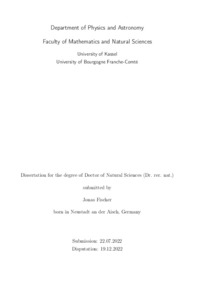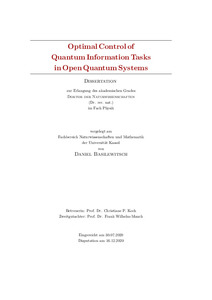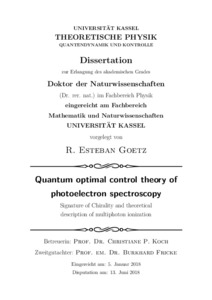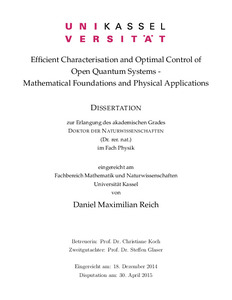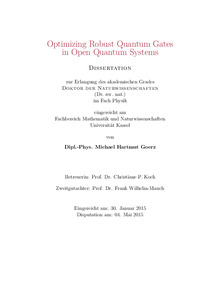Search
Now showing items 1-5 of 5
Dissertation

 Control of Open Quantum Systems: Examples & Methods for Non-Markovian Dynamics
Control of Open Quantum Systems: Examples & Methods for Non-Markovian Dynamics
(2023)
Usually open quantum systems are considered to be under the influence of noise and therefore faulty. On the other hand, a controlled system is regarded as something stable and predictable. It is often neglected, that the two aspects are very closely related. A perfectly isolated quantum system will not be subject to environmental influences, but this makes it also impossible to interact with it in any manner. Controlling and measuring such a system is impossible and therefore of no technical relevance. Every system ...
Dissertation

 Optimal Control of Quantum Information Tasks in Open Quantum Systems
Optimal Control of Quantum Information Tasks in Open Quantum Systems
(2020-07-30)
Every quantum system inevitably interacts with its environment. This is a fundamental requirement that allows us to control, measure and, in general, interact with quantum systems. In that respect, a quantum system's openness can be interpreted as prerequisite that enables quantum technologies in the first place. The latter are built to harness the intrinsic quantum mechanical behavior of quantum devices in order to build new, powerful technologies. However, a quantum system's openness also causes it to interact ...
Dissertation
 Quantum optimal control theory of photoelectron spectroscopy
Quantum optimal control theory of photoelectron spectroscopy
(2018)
The object of this doctoral thesis is two-fold and can be classified into two, but intrinsically related categories: (i) development of theoretical models for the simulation of electron dynamics and in parallel to this, (ii) method development of efficient numerical algorithms for ad hoc control of photoelectron and photoion-related observables. The first category primarily focuses on the development of a variety of theoretical models describing the interaction of light and matter for the extraction and control of ...
Dissertation
 Efficient Characterisation and Optimal Control of Open Quantum Systems - Mathematical Foundations and Physical Applications
Efficient Characterisation and Optimal Control of Open Quantum Systems - Mathematical Foundations and Physical Applications
(2015-06-19)
Since no physical system can ever be completely isolated from its environment, the study of open quantum systems is pivotal to reliably and accurately control complex quantum systems. In practice, reliability of the control field needs to be confirmed via certification of the target evolution while accuracy requires the derivation of high-fidelity control schemes in the presence of decoherence.
In the first part of this thesis an algebraic framework is presented that allows to determine the minimal requirements on ...
Dissertation
 Optimizing Robust Quantum Gates in Open Quantum Systems
Optimizing Robust Quantum Gates in Open Quantum Systems
(2015-05-27)
We are currently at the cusp of a revolution in quantum technology that relies not just on the passive use of quantum effects, but on their active control. At the forefront of this revolution is the implementation of a quantum computer. Encoding information in quantum states as “qubits” allows to use entanglement and quantum superposition to perform calculations that are infeasible on classical computers. The fundamental challenge in the realization of quantum computers is to avoid decoherence – the loss of quantum ...

